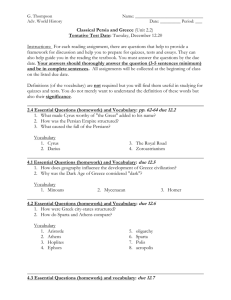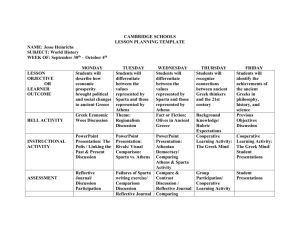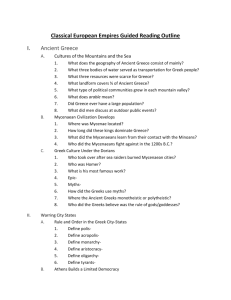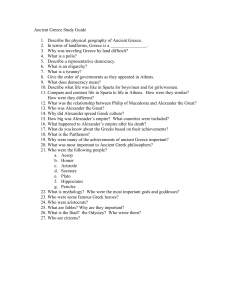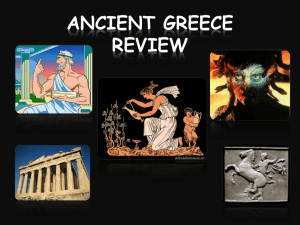Ancient Greece Powerpoint
advertisement
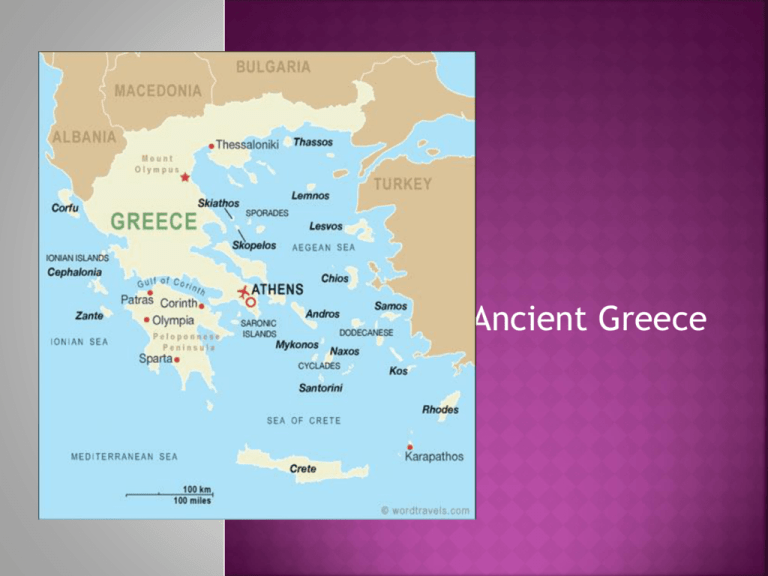
Ancient Greece Greece lies on a peninsula that reaches out into the Mediterranean Sea east of Italy. Greece is very mountainous. Therefore, farming is difficult. From the very beginning, Greeks have made a living from the sea. Ancient Greece was home to many adventurous warriors, philosophers, poets, architects, and sculptors. Homer Plato Ancient Greece is called the “Cradle of Western Civilization.” This means that the Greek were the first people to ask questions like, “how do we know the truth? How do we know what is right or wrong? What is the best way to govern society? The Greeks treasured their historic myths. Homer wrote two of the greatest Greek poems, the Iliad and the Odyssey. They tell the story of the Trojan War. For many centuries, Greece was divided into city-states. Two primary city-states were Athens and Sparta. Both Athens and Sparta had very different and opposing ways of living the Greek life. Known as a land of military sacrifice and discipline. All life in Sparta was directed to making strong warriors. Its citizens were soldiers, first and foremost, and its armies were the best trained in Greece. At the age of 7, children left their homes to train in the ways of war. The form of government Sparta had is called an oligarchy. Oligarchy – political rule by a small group. Sparta had originally been formed from 2 cities each with its own king. When these 2 cities united both kings were kept and became generals of the army. Sparta thought of themselves as a monarchy (governed by a king or queen) because they had kings. Athens developed into a democracy. Democracy – political rule by all of the people governed. Every citizen had the right to vote for or against laws. Ordinary citizens were able to serve as judges or magistrate. Magistrate – an officer of the government who has the power to enforce laws. In order to be good citizens, boys were taught to read, write, do math, and speak persuasively. They studied military history so that they could one day serve as army officers. At this time, 500BC, the Persian Empire was the greatest power. Athens assisted the city of Sardis in revolting against Persia and its King Darius. Sardis was a city controlled by Persia. King Darius vowed revenge on the Athenians for helping. Battle of Marathon – Outnumbered Athens defeats the Persian army without any help from any other Greeks. The Brave 300 – Sparta’s king, Leonidas and his army of 300 held back the Persians and King Xerxes. Their defeat was not a failure because they had help the Persians back allowing other Greek cities to organize their armies. Invasion of Peloponnesus – Themistocles and his Greek ships defeat the Persians by ramming the Persian ships and then boarding for hand-to-hand attack. Athens and its allies formed the Delian league after the defeat of Persia to defend Greece. In 461BC, Pericles became the chief political leader making him the most powerful man in Athens for 33 years. Under Pericles, many great buildings were built. Parthenon – a temple built for the goddess Athena. Phidias, the sculptor who was in charge of building the Parthenon made a statue of Zeus at Olympia. This statue was so great that it is considered one of the seven wonders of the world. Athens and Sparta go to war. Athens sought to rule all of Greece. By 413BC Athens fell to Sparta and the Athenian empire ended. Socrates, a Greek philosopher, believed that the purpose of men was to understand what is right and good, and then to do it. He was condemned to death from false charges of corrupting youth. His student, Plato, carried on Socrates’ influence. Aristotle also studied with Plato. He is considered the father of modern science. The Father of Medicine – the first great doctor in history was Hippocrates. He was believed to be descended from Aclepius, the god of healing. He discovered that each part of the body had a special function or task to perform. He founded a guild of physicians where members had to swear an oath to heal, do no harm, and not to reveal patients’ secrets. This is called the Hippocratic Oath that all physicians took until the end of the 20th century. Democratic government – the idea of government by the people, trial by jury, and equality were introduced in 500BC. Modern science – They introduced principles of medicine, physics, biology, and math. Greek art and architecture – many modern building designs reflect Greek styles. Drama – Aristotle created the rules for drama. Movie scriptwriters still use his ideas. Alexander the Great helped spread the ideas of the Greeks. He was king of Macedonia in northern Greece and wanted his kingdom to be large. He conquered an area as large as the U.S. in 10 years. In his new lands he established Greek cities, Greek language, and Greek ideas.


